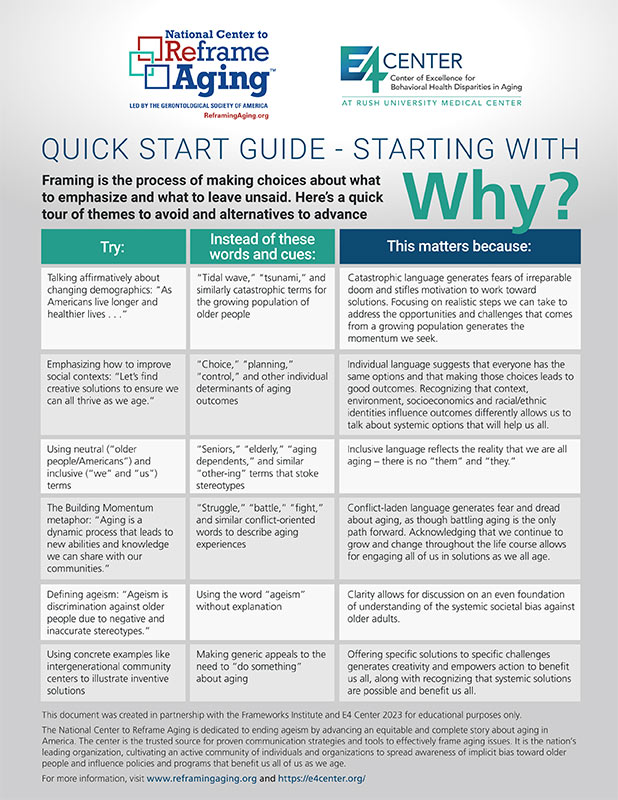Center of Excellence to Address Behavioral Health Disparities in Aging
When Rush University sought funding from the Substance Abuse and Mental Health Services Administration (SAMHSA) in 2020 for the E4 Center of Excellence for Behavioral Health Disparities in Aging, they included principles to reframe aging as a strategy to address ageist language. That decision began a transformative change in how the E4 Center—with its focus to Engage, Educate, and Empower for Equity — and its many partners communicate about aging.
As an academic center of excellence, Rush’s E4 Center has the power and reach to influence the healthcare professionals of today and tomorrow with evidence-based practices. Co-director of the E4 Center, Erin Emery-Tiburcio, PhD and Robyn Golden, LCSW, underscores the credibility of the National Center to Reframe Aging and its research-backed tools. Erin can point to research proving words matter and the everyday words we use can influence how long and well a person lives. She uses this powerful evidence to combat ageism and convince healthcare leaders and academic peers to change how they talk about aging.
The grant was awarded by SAMHSA and enabled staff at the E4 Center and 18 partner organizations to participate in the National Center to Reframe Aging’s training on the principles to reframe aging. Vital takeaway messages from the training led to steps for internal change, including creating guidelines for all speakers at E4 Center events to ensure consistent language that respects and empowers older people. Principles that they learned also led to practice changes at the state level through collaboration with organizations such as the Illinois Partners for Human Service and at the national level through the Institute for Healthcare Improvement, which leads the Age-Friendly Health Systems movement.
Erin emphasizes that culture change doesn’t happen overnight, and even when you don’t get an overwhelmingly positive response, you need to keep having conversations. She also notes, “There has to be some ownership somewhere in an organization when creating this sort of change — it will not happen on its own.”
The staff at the E4 Center may be small, but Erin points out, “Our strength is really in our partnerships.” Thanks to SAMHSA’s funding for training, Erin’s persistent leadership, and a strong evidence base, the principles to reframe aging are now embedded in the E4 Center and used by a growing number of its partners.
Join the Movement to Reframe Aging
The National Center to Reframe Aging is developing tools to help advocates across the country effectively communicate for policies and funding that support the well-being of all of us as we age.
- What are the everyday ways you can address ageist language in your work?
- What events and projects present opportunities for you to reframe aging?
- Who are the allies and partners that are likely to support a change in the conversation about aging?
- How can the tools from the National Center to Reframe Aging help you to change the way you talk about aging?
Reach out to the National Center team to learn how you can inspire change within your state!
